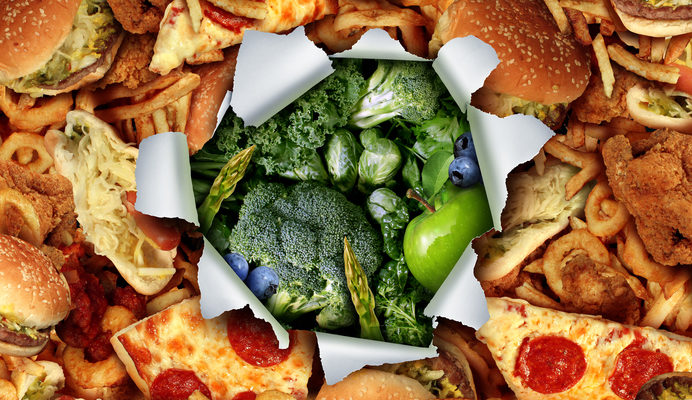5 Fad Diet Claims You Should Never Believe
Article posted in: Diet & Nutrition
Be honest: You’ve been lured into plenty of diets by outlandish fad diet claims of quick, effortless, even “magical” weight loss. Well, welcome to the club.
Deep down, you knew they weren’t going to work, but you were so desperate to lose weight once and for all, you ignored that wise inner voice screaming “con job!”
The law says that any weight loss claim needs to be backed by scientific evidence, but even some trusted media outlets will air unproven assertions which makes it even harder for you to spot false advertising.
Check out these common false fad diet claims identified by the Federal Trade Commission, which regulates weight loss advertising:
1. “Safely lose three pounds or more every week without dieting or exercise!”
Losing three pounds or more the week you start a diet isn’t unusual. You’re usually shedding fluid along with fat—but every week? You could be in trouble.
There is so much wrong with this claim, we don’t know where to start. First, the word “safely.” Losing three pounds or more a week over time can lead to gallstones, which are hard crystals that can form in the gallbladder, a vital part of your digestive system. Many are silent—meaning you don’t know they’re there—but they can be extremely painful and cause fever, chills and nausea. Some people may require surgery.
Losing a ton of weight fast can also lead to loose skin, which can be minor to severe depending on your age and how much weight you’ve lost. Older skin, for example, is less elastic and not as likely to spring back. Sometimes building muscle can help. In many cases, surgery is your only solution.
Furthermore, it’s nearly impossible to lose that much weight every week, unless you’re devoting every waking minute to exercise—that or you’re eating so little you’re bordering on malnutrition. Very low-calorie diets usually require supervision from a healthcare provider because they’re risky for your health.
If you’re looking to lose weight permanently, studies have shown that this is not the way to do it. Research has found that people who lose one to two pounds a week—keeping it slow and steady—are more likely to keep the weight off.
2. “Drop four dress/pants sizes in 30 days!”
This is a common fad diet claim. There’s no clear universal correlation between the amount of weight loss and dropping a dress or pants size. It’s an individual measurement, depending on your weight, height and even the brand of clothing you choose. Some clothing manufacturers are practicing what’s called “vanity sizing:” Labeling clothing a size smaller than they really are, writes Roger Dooley in Forbes Magazine. So those “medium pants” you’re wearing might have been “large” last year.
In any case, the same cautions apply to this claim as they do to the one above: Quick weight loss is not a good, safe or permanent solution.
3. “Your weight loss will be permanent even when you go off the program!”
If only! Permanent weight loss doesn’t depend on magic, which is what this claim promises. Weight loss is hard, but so is weight maintenance. It requires vigilance and, according to the successful losers in the National Weight Control Registry, which follows people who have lost weight and kept it off for at least a year, some very specific habits. Most of the people in the study—some of whom have lost hundreds of pounds—exercise about an hour a day, always eat a healthy breakfast (usually cereal), weigh themselves weekly and stick to a diet in the 1,300-calorie range. That’s the only “magic” involved in permanent weight loss.
4. “Eat as much as you want and still lose weight!”
This might be the most outlandish of all fad diet claims out there. There’s actually a scientific formula that says that’s impossible. The only way to lose weight is to burn off more calories than you take in, according to the Federal Trade Commission. To accomplish that, you have to eat less and exercise more, particularly if you’re not active to start with. According to the Center for Disease Control, since it takes 3,500 calories to make one pound, you need to reduce your daily intake by 500-1,000 calories to lose one to two pounds a week, depending on your size, age and genetic makeup.
Look on the bright side: You may not be able to eat as much as you want, but you can certainly eat what you want. Nutrisystem is proof: When you can lose weight eating pizza, burgers, mac and cheese and ice cream—provided you’re watching portions—your satisfaction levels go up so quantity may not matter so much.
5. “This product makes fat disappear!”
You’ve seen TV advertisements for over-the-counter products that promise to melt away fat and inches or block fat, starch, sugar or calorie absorption for quick and permanent weight loss. No OTC product works without an accompanying reduced calorie diet, says the FTC. Even Food and Drug Administration-approved prescription weight loss drugs require you to diet and exercise.
So what’s the take-away? You should always be skeptical of any fad diet claim. Their false claims make them illegitimate and they are not backed by science.
Nutrisystem is a weight loss plan that has worked for millions of people and is backed by science. You get a weight loss plan that is customizable to your needs and gives you the freedom to eat everyday foods in healthy portions—without any fads or gimmicks. Get started today!











